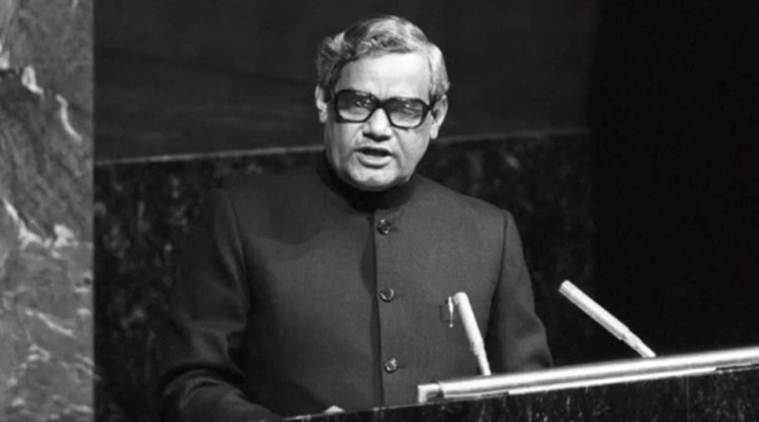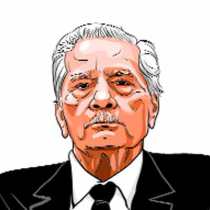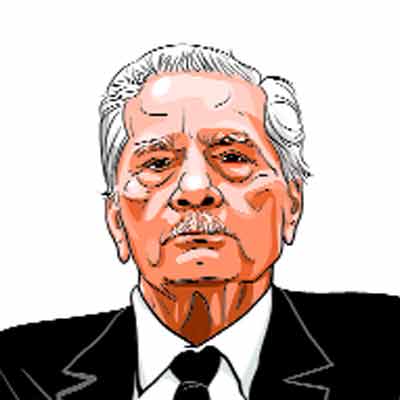Atal Bihari Vajpayee: Secularist who belonged to Sangh
His humanity made Atalji rise above parochialism.

Atal Bihari Vajpayee
It was March 1977. The newly-formed Janata Party had swept the polls in North India and was to assume office as the first non-Congress government at the Centre. There were three contestants for the prime minister’s post: Morarji Desai from the erstwhile Congress (O) faction, Charan Singh from the Bharatiya Lok Dal faction and Babu Jagjivan Ram from the Congress for Democracy (CFD), which had collaborated with the Janata Party. The Jana Sangh faction, under Atal Bihari Vajpayee’s leadership, had promised support to Jagjivan Ram. He was, therefore, hopeful of winning the contest
When the elected members of the Janata Party and CFD met at Rajghat to be administered an oath by Jayaprakash Narayan (JP), who had been instrumental in bringing the different opposition parties together, the disturbing news of the contest had made headlines. I had not contested the election. But as the all-India treasurer of the Janata Party, I reached Rajghat. Madhu Limaye met me and, disturbed by the reports of the conflict, asked, “What is all this, Shanti Bhushanji?” I told him it was indeed very disturbing since people had voted for our candidates believing they were selfless. They would be disillusioned by the behaviour of these leaders.
After taking their oath, the important leaders sat down to discuss this problem. Apart from Limaye and me, Chandrashekhar, Krishan Kant, Nanaji Deshmukh and a few other leaders were present. I said the 1977 election had been a revolt against the excesses of the Emergency. Therefore, the people would accept anyone who had suffered during the Emergency as the PM. But they were not likely to endorse a person who had been a party to the Emergency, at least at that stage. The first person to react to this was Chandrashekhar from the CFD. He said that there could be no denying what I had said. Nanaji Deshmukh from the Jana Sangh faction was also convinced about what I had said. At that time, I was not aware that his faction had promised support to Jagjivan Ram. Deshmukh asked me to accompany him to JP, where I repeated my thoughts. He then took me to meet Vajpayee and the three of us went to Jagjivan Ram’s place to tell him that it would not be possible for the Jana Sangh to fulfill its promise of support. On hearing this, Jagjivan Ram became very angry. A visibly upset Vajpayee started sobbing and put his head in the lap of Jagjivan Ram. I could see how Atalji felt the remorse of his betrayal. This was my first glimpse of the human side of this great secular leader.
I had a close association with Atalji from 1977 to 1979 as a colleague in the Morarji Desai government. I also interacted closely with him from 1980 to 1986, when Atalji was the president of the newly-formed Bharatiya Janata Party and I was the party’s treasurer.
I respected Atalji for his fiercely secular thinking. In 1986, when he ceased to be the party’s president to make room for L K Advani, and the BJP decided to go ahead with the Hindutva ideology, I quit the party.
I recall when we brought the first impeachment motion against a Supreme Court judge, Justice V Ramaswami. I went to Parliament to get the motion signed by the leaders of different political parties. When I approached Atalji, his first reaction was that the charges in the motion appeared very minor: They seemed like the charge of stealing a chicken. I responded that this was not quite true. But even then, did he want a person who was in the habit of stealing chickens to continue as a Supreme Court judge? Atalji told me that I was right and signed the motion.
He also signed the impeachment motion against another Supreme Court judge, Justice M M Punchhi and asked other members of his party to sign the motion. The motion had the requisite 100 signatories, but the then RSS chief and Advani intervened and did not allow the signatures to reach us. The impeachment motion failed.
It is believed that Atalji was the first to make a formal speech in the UN in Hindi. Shortly after that, the government’s Hindi committee met under the chairmanship of Morarji Desai. Atalji and I were members of the committee. When Atalji was being congratulated, I told him that his speech was actually the second speech in Hindi in the UN. The first formal speech had been delivered by a Muslim officer of the external affairs ministry. He acknowledged that it was so.
The problem about delivering a speech in Hindi in the UN was that it had to be simultaneously translated into all the other languages recognised by the body. But there was a lack of interpreters to translate Atalji’s speech in different languages. I was in the UN for the Law of the Sea Conference at that time. The Muslim officer of the external affairs ministry found a beautiful solution. He teamed up with the wife of another officer of the ministry. They decided that Atalji’s written speech in Hindi would be translated in English. And while Atalji was reading his speech, the wife of the external affairs ministry officer would read out the English translation from which the interpreters would translate.
It was decided to try this experiment at one of the committee meetings of the UN where the External Affairs Ministry officer was supposed to speak. The interpreters translated what was read out in English and the speech was adequately communicated in the various languages. The experiment having succeeded, the process was followed when Atalji made his first Hindi speech before the UN. Atalji did not fail to acknowledge the debt owed by him to the officer.
Many have said that Atalji was the right person in a wrong party. It is amazing that he remained staunchly secular even though he had emerged from the RSS. Perhaps, if he had not fallen so serious ill about 12 years back, the course that the party took would have been different.
The writer, a senior advocate at the Supreme Court, was Union law minister from 1977-79
For all the latest Opinion News, download Indian Express App
More From Shanti Bhushan
- Disagree, Don’t LabelIt is not anti-national to denounce a court judgment or ask for azaadi for Kashmir...
- Delhi Jan Lokpal bill: Arvind Kejriwal has turned ombudsman into a jokeArvind Kejriwal has tabled a bill that gives him full control over selection and removal of the ombudsman..
- NJAC verdict: Govt bound to go by advice of CJIIt needs reform. But government is bound to go by the advice of chief justice of India in appointments..








































No hay comentarios:
Publicar un comentario